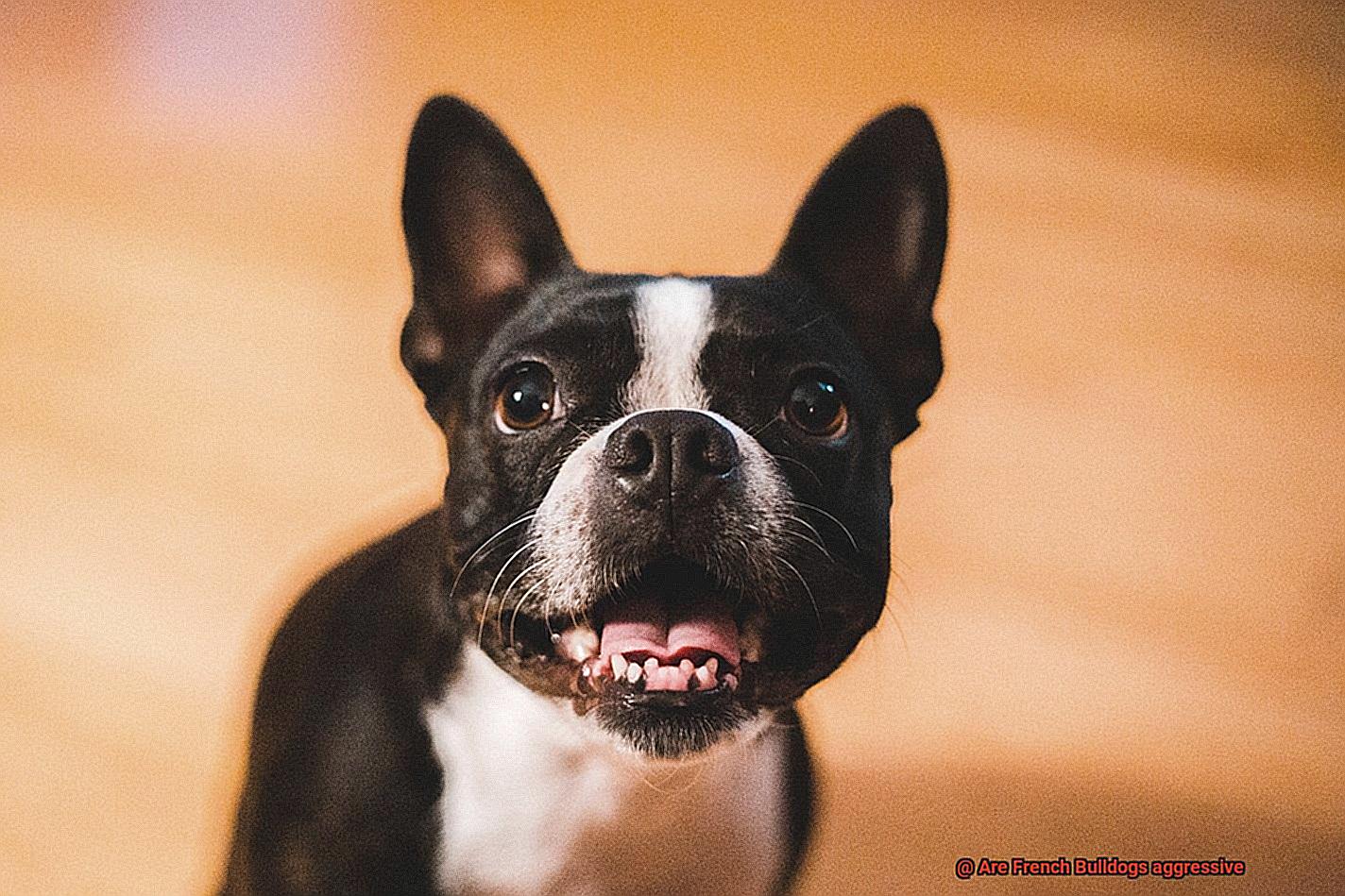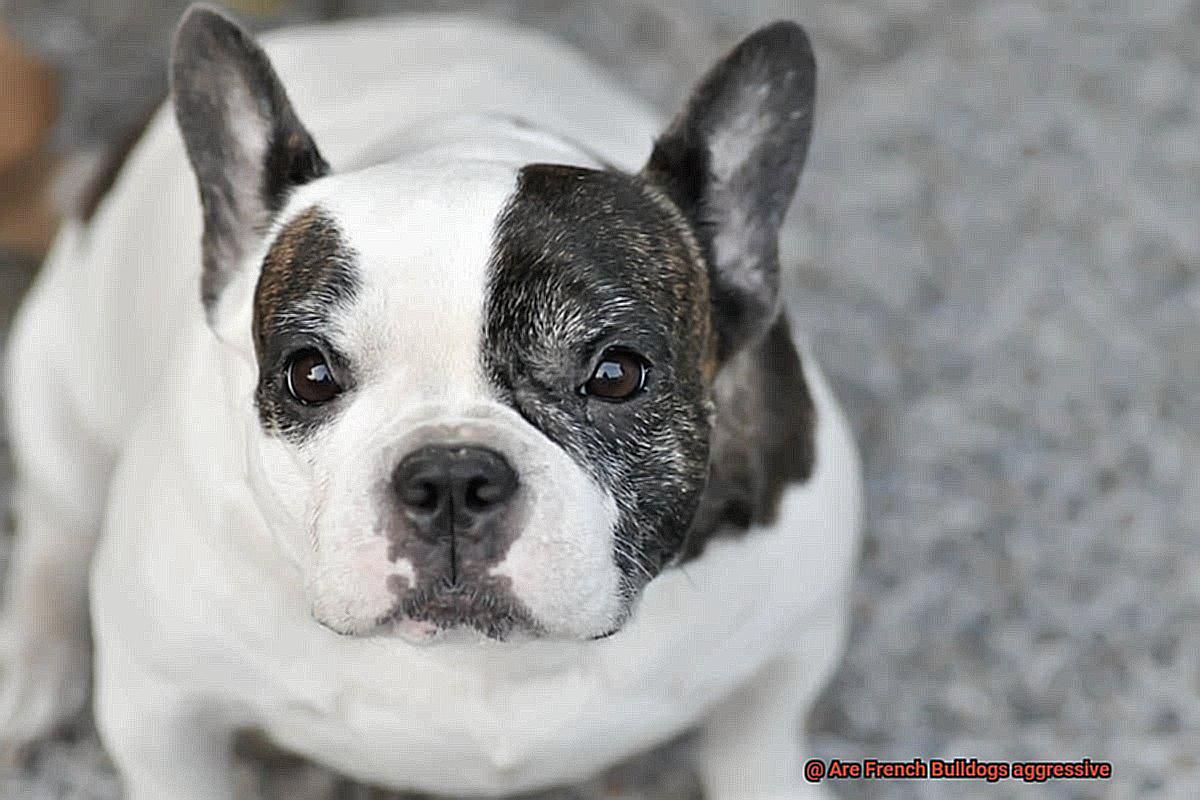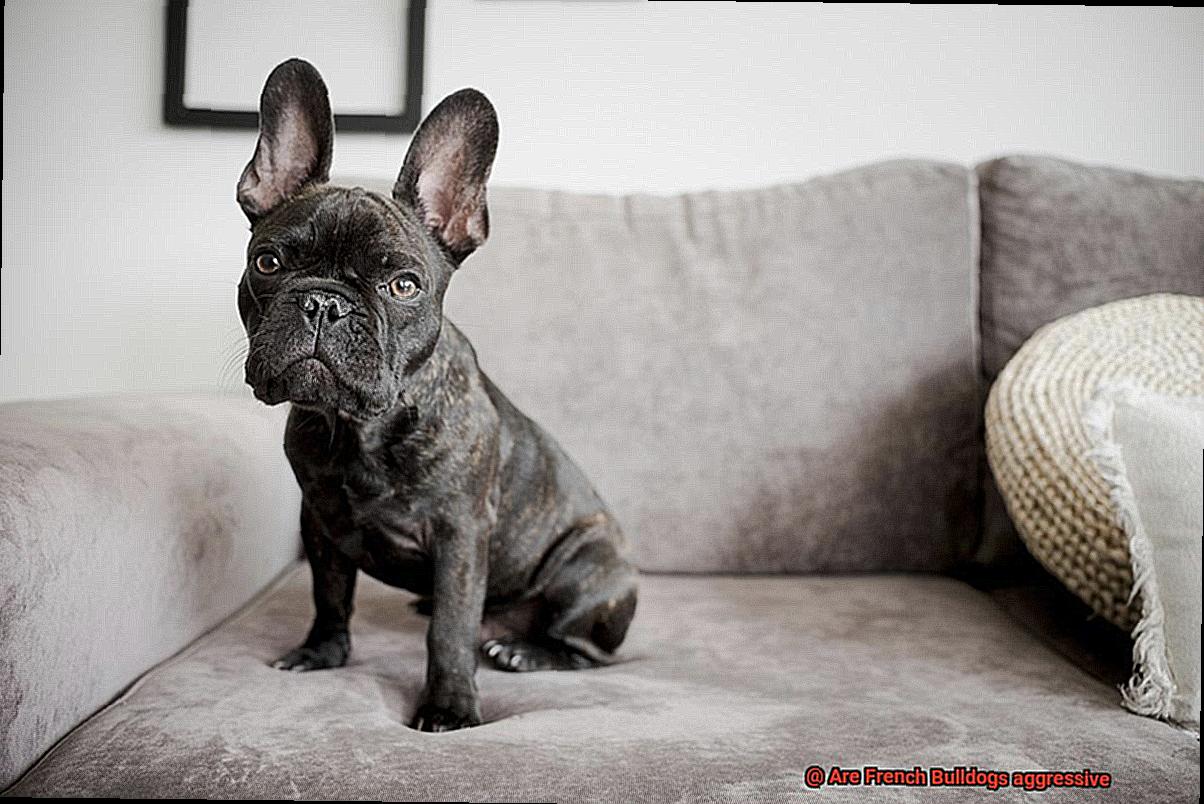Are French Bulldogs aggressive?
Are French Bulldogs aggressive? It’s a question that pops up a lot among dog lovers and folks thinking about getting one.
These little bundles of joy have become quite popular thanks to their cute looks and lovable personalities. In this article, we’ll dig deep into the world of French Bulldogs, uncovering their well-known traits like their gentle and affectionate nature.
So, whether you’re crazy about French Bulldogs, thinking of getting one, or just curious about their behavior, get ready for some insider info on these captivating furry pals.
French Bulldog Breeding Practices and Aggression
Contents
- 1 French Bulldog Breeding Practices and Aggression
- 2 The Role of Socialization in Reducing Aggression in French Bulldogs
- 3 How Mistreatment Can Lead to Aggression in French Bulldogs
- 4 Assertiveness Versus Aggression in French Bulldogs
- 5 Training Tips for Curbing Unwanted Behaviors in French Bulldogs
- 6 Recognizing the Signs of Fear-Based Aggression in French Bulldogs
- 7 How Genetics Affects the Temperament of a French Bulldog
- 8 Professional Help for Dealing with an Aggressive French Bulldog
- 9 Conclusion
French Bulldogs are beloved for their friendly and affectionate nature, making them excellent companions for individuals and families alike. While aggression is not a common trait in this breed, it’s essential to understand how breeding practices can influence a French Bulldog’s temperament.
In this guide, we’ll explore responsible breeding practices that can help reduce the risk of aggression in French Bulldogs, ensuring they remain gentle and well-behaved companions for life.
Selecting Parent Dogs:
- Responsible breeders prioritize temperament when choosing parent dogs.
- Both the sire and dam should have stable temperaments with no history of aggression or behavioral issues.
- By selecting parent dogs with good behavior traits, breeders can significantly reduce the risk of producing aggressive French Bulldogs.
Early Socialization:
- Proper socialization from an early age is crucial for French Bulldogs.
- Expose puppies to various people, animals, and environments to build confidence and prevent fear-based aggression.
- Introduce them to different sights, sounds, and experiences to create a well-rounded adult dog.
Health Testing:
- Breeders should prioritize health testing and screening for genetic disorders.
- Certain health conditions can contribute to aggressive behavior in French Bulldogs.
- By ensuring parent dogs are free from these conditions, breeders can minimize the risk of aggression in their offspring.
Avoid Extreme Physical Characteristics:
- Overly exaggerated features can lead to health issues that may manifest as aggression or irritability.
- Breeding for extreme physical traits like excessively short muzzles or compact bodies can cause breathing difficulties or joint problems.
- Responsible breeders prioritize the overall health and well-being of their dogs over exaggerated aesthetics.
The Role of Socialization in Reducing Aggression in French Bulldogs
The Role of Socialization in Reducing Aggression in French Bulldogs
French Bulldogs are known for their friendly and affectionate nature, but like any other dog breed, they have the potential to display aggressive behavior. However, aggression is not a characteristic trait of the breed and can be significantly reduced or even eliminated altogether through proper socialization and training.
Socialization plays a crucial role in shaping a French Bulldog’s behavior and temperament. It refers to the process of exposing the dog to various people, animals, environments, and experiences from an early age. By exposing them to different stimuli, the dog learns to adapt and become more confident in different situations.
Early socialization is particularly important for French Bulldogs due to their tendency to develop separation anxiety and become overly attached to their owners. When a dog lacks proper socialization, they may become fearful or anxious in unfamiliar situations, leading to defensive or aggressive behavior as a means of self-protection.
So, how can you socialize your French Bulldog effectively? Here are some tips:
- Controlled exposure: Introduce your puppy to friends, family members, and other pets in a calm and supervised environment. Encourage positive interactions by rewarding good behavior with treats and praise. This will help your French Bulldog associate new experiences with positive outcomes.
- Exposure to different environments: Take your dog on regular walks in different neighborhoods, parks, and busy areas. This exposure will help them become accustomed to different sights, sounds, and smells, making them less likely to react aggressively when faced with unfamiliar stimuli.
- Positive interactions with other dogs: Organized playdates or visits to dog parks can provide valuable opportunities for your pet to interact and learn appropriate social behaviors from other dogs. However, closely monitor these interactions and intervene if any signs of aggression or fearfulness arise.
- Training and obedience classes: Enroll your French Bulldog in training and obedience classes. These classes provide structured environments where dogs can learn basic commands, proper behavior, and how to interact with other dogs and people. The guidance of a professional trainer can help address any specific behavioral issues and provide individualized training techniques.
Remember, socialization is an ongoing process throughout a French Bulldog’s life. Regular exposure to new experiences, people, and animals should be continued even after the puppy stage. This will help reinforce positive behavior and prevent the development of aggression as the dog matures.
In conclusion, socialization plays a significant role in reducing aggression in French Bulldogs. Through early and continued exposure to various stimuli, positive interactions with people and animals, and obedience training, French Bulldogs can grow up to be well-adjusted and friendly companions. However, it is important to remember that every dog is unique, and some may require more extensive socialization or professional assistance to overcome aggression issues.
How Mistreatment Can Lead to Aggression in French Bulldogs
Today, we’re diving deep into the murky waters of mistreatment and its impact on our lovable companions. French Bulldogs are known for their friendly and affectionate nature, but when subjected to mistreatment, they can turn from gentle sailors to fierce pirates. So, grab your eye patches and let’s set sail on this adventure.
The Forms of Mistreatment:
Arrr, mistreatment comes in various shapes and sizes, mateys. Physical abuse, neglect, and harsh training methods be some of the culprits that can send our Frenchies down a treacherous path. These forms of mistreatment can stir up fear, anxiety, and stress in our furry friends, making ’em more likely to show aggression.
The Impact of Physical Abuse:
Shiver me timbers. When a French Bulldog be subjected to physical abuse such as rough handling or scurvy hits, trust be lost faster than a ship sinking in a storm. Fear takes hold, and our sea-loving pups may lash out in defense, using aggression to protect themselves from further harm.
The Perils of Neglect:
Neglect be another treacherous sea that can lead to aggression in French Bulldogs. When basic needs like food, water, exercise, and social interaction be denied, frustration builds up like a brewing tempest. Aye, this frustration can unleash aggressive behaviors as our furry mates try to reclaim control of their lives.
Harsh Training Methods:
Avast ye. Be careful with how you train your French Bulldog or ye might be walking the plank towards aggression. Using punishment or force during training can create a dark cloud over certain behaviors or situations. That cloud be full of fear and frustration, making our dogs respond with aggression like a cannonball firing from a pirate ship.
The Bigger Picture:
Blimey. While mistreatment be a powerful force, it doesn’t paint the whole picture. Genetics, socialization, and other environmental factors be also at play. But beware, mateys, for mistreatment can exacerbate existing tendencies or trigger aggression in even the calmest of French Bulldogs.
Recognizing the Signs:
Avast ye, landlubbers. Keep a weather eye out for signs of mistreatment-induced aggression. Growling, snarling, snapping, biting – these be red flags flying high on the mast. Defensive body language like raised hackles and a stiff posture be telltale signs too. Don’t ignore them or ye might end up in Davy Jones’ locker.
Assertiveness Versus Aggression in French Bulldogs
Well, batten down the hatches and get ready to set sail as we navigate the treacherous waters of understanding and managing these behaviors. In this article, we’ll explore the differences between assertiveness and aggression in French Bulldogs and provide you with tips on how to effectively steer your pup towards a well-behaved and balanced demeanor.
The Distinction:
Charting a course through behavior, it’s crucial to understand that assertiveness is a confident expression of needs, while aggression involves harmful intentions. Assertive Frenchies may stand tall, maintain eye contact, or vocalize to communicate their desires or protect their belongings.
On the other hand, aggression can manifest as growling, snapping, lunging, or biting, often triggered by fear, pain, or a sense of threat.
Setting Sail Towards Assertiveness:
To ensure smooth sailing with an assertive Frenchie, it’s paramount to establish yourself as the captain of the ship.
Set clear boundaries and reinforce them consistently. Use positive reinforcement techniques like treats and praise when your pup exhibits desirable behaviors.
Socialization is vital too. Expose your Frenchie to various people, animals, and environments from an early age to boost confidence and reduce reactivity.
If your Frenchie starts hoisting the Jolly Roger of aggression, it’s essential to address the underlying cause swiftly. Consult a professional trainer or behaviorist who can help you navigate these choppy waters effectively. Remember that aggression can stem from fear, pain, or lack of proper socialization. Treatments may include desensitization exercises, counter-conditioning techniques, or medication if necessary.

Training Tips for Curbing Unwanted Behaviors in French Bulldogs
French Bulldogs are known for their friendly and affectionate nature. However, like any other breed, they may exhibit unwanted behaviors such as aggression, biting, chewing, and excessive barking.
In this blog post, we will explore the importance of positive reinforcement, consistency, socialization, and professional help in curbing these behaviors and raising a well-behaved French Bulldog.
The Power of Positive Reinforcement:

Positive reinforcement is a highly effective training method for French Bulldogs. By rewarding desired behaviors with treats, praise, or playtime, you can motivate your furry friend to repeat those behaviors. Avoid punishment-based methods as they can lead to fear or aggression.
Consistency is Key:
Consistency is crucial when training French Bulldogs. Establish a set of rules and routines and stick to them. This helps your dog understand what is expected of them and reduces confusion. Consistency also applies to your behavior as an owner—be consistent in your commands and reactions.
The Importance of Socialization:
Socialization plays a vital role in preventing aggression in French Bulldogs. Introduce your dog to different people, animals, and environments from a young age. This helps them become more comfortable and confident in various situations, reducing the likelihood of aggressive behavior.
Seek Professional Help:
If you are struggling with curbing aggressive behaviors in your French Bulldog or any other unwanted behaviors, it is important to seek professional help. A certified dog trainer or behaviorist can assess the situation and provide specialized guidance and training techniques suited to your dog’s needs.
Remember Every Dog is Unique:
Every French Bulldog is unique, and some may require more time, patience, and training than others. Be consistent, positive, and understanding throughout the training process to help your French Bulldog become a well-behaved and non-aggressive companion.
Recognizing the Signs of Fear-Based Aggression in French Bulldogs
Recognizing the Signs of Fear-Based Aggression in French Bulldogs
French Bulldogs are known for their adorable, playful nature, but just like any other breed, they can sometimes exhibit fear-based aggression. As a responsible owner, it’s crucial to recognize the signs of fear-based aggression in order to address the issue effectively and ensure the safety of your beloved pet and others. So, let’s dive into the world of French Bulldogs and learn how to spot these signs.
- Growling or Snarling: One of the most noticeable signs of fear-based aggression is growling or snarling. When a French Bulldog feels scared, they may vocalize their discomfort through these aggressive sounds.
- Lunging or Snapping: A fearful French Bulldog may lunge towards people or other animals, trying to create distance and ward off potential threats. This can be accompanied by snapping motions.
- Raised Hackles: Raised hackles, which are the hairs on the back of a dog’s neck and shoulders, can also indicate fear-based aggression. When a French Bulldog feels threatened, their hackles may rise as a defensive response.
- Tense Body Posture: A tense body posture is another telltale sign. Fearful French Bulldogs may stiffen their body, with their tail held low or tucked between their legs.
- Avoidance Behavior: Fear-aggressive French Bulldogs may try to retreat from the situation by moving away or hiding. This avoidance behavior is a clear indication that they feel threatened.

Understanding these signs can help you identify when your French Bulldog is feeling threatened and take appropriate measures to manage the situation. Remember that punishment or scolding is not effective and can actually make the fear-based aggression worse.
Instead, focus on positive reinforcement techniques to desensitize your dog gradually. Reward calm behavior, provide a safe space for them to retreat to, and gradually expose them to the triggering stimuli in a controlled and relaxed manner. Seeking professional help from a dog behaviorist or trainer experienced in handling fear-based aggression can also be beneficial.
How Genetics Affects the Temperament of a French Bulldog
French Bulldogs are known for their adorable wrinkled faces and playful nature. But have you ever wondered why some Frenchies are more outgoing and sociable, while others may be a bit more reserved? The answer lies in their genetics. Let’s dive into how genetics affects the temperament of a French Bulldog.
Ancestral Roots:
French Bulldogs have a rich history that can be traced back to their ancestors, who were originally bred for specific purposes. These dogs were bred to be companions, providing love and affection to their owners. As a result, French Bulldogs have inherited a friendly and sociable nature from their ancestors.
Playful and Affectionate:
French Bulldogs are well-known for their playful and affectionate nature. This is largely due to their genetic makeup. They have a natural inclination towards being loving and spending quality time with their human companions. Whether it’s cuddling on the couch or playing fetch in the park, French Bulldogs are always up for some fun.
Genetic Variation:
While genetics play a significant role in determining a French Bulldog’s temperament, it’s important to note that not all Frenchies will have the same personality traits. Just like humans, dogs have individual differences within the same breed. So, don’t be surprised if your Frenchie has a unique personality of its own.
Environmental Factors:
Although genetics lay the foundation for a French Bulldog’s temperament, environmental factors such as socialization and training also play a crucial role. Exposing your Frenchie to different people, animals, and environments from an early age can help shape their behavior positively. Training them with positive reinforcement techniques can also contribute to their overall temperament.
Choosing the Right Breeder:
To increase the chances of getting a well-adjusted and friendly French Bulldog, it’s essential to choose a reputable breeder who focuses on breeding dogs with good temperaments. A responsible breeder will prioritize temperament alongside health and conformation.
Addressing Aggression:
While aggression is not a common trait in French Bulldogs, it can still occur in some individuals. Aggression can be caused by various factors such as fear, dominance, or lack of proper training and socialization. If you notice signs of aggression in your Frenchie, seek professional help from a veterinarian or dog behaviorist to address the issue effectively.
Professional Help for Dealing with an Aggressive French Bulldog
While these adorable pups are known for their playful and affectionate nature, aggression can arise due to various reasons, including genetics, poor socialization, fear, or other underlying factors. In such cases, seeking professional help is essential to ensure the well-being of your Frenchie and create a harmonious living environment. So let’s dive into why professional help is your best course of action.

Expert Assessment and Customized Training:
Certified dog trainers or behaviorists who specialize in working with aggressive dogs are equipped with the knowledge and experience to evaluate your Frenchie’s behavior. They can identify the root causes of aggression and develop a tailor-made training plan to address the issue effectively. With their expertise, they can guide you through positive reinforcement techniques that focus on rewarding desired behaviors and teaching alternative responses.
Medication as a Complementary Solution:
In some cases, medication may be recommended to manage aggression in French Bulldogs. A veterinary behaviorist can evaluate your Frenchie’s overall health and behavior, prescribing appropriate medications if necessary. It’s important to note that medication should always be used in conjunction with behavior modification training, as it is not a standalone solution. The combination of professional guidance and medication can greatly improve your Frenchie’s behavior.
Support from Fellow Frenchie Owners:
Joining support groups or forums specifically designed for French Bulldog owners dealing with aggression issues can provide a wealth of knowledge and emotional support. These communities allow you to connect with people who have faced similar challenges and offer guidance based on their own experiences. Sharing your journey with others who understand what you’re going through can be immensely helpful and comforting.
Conclusion:
Dealing with aggression in your French Bulldog requires a dedicated and consistent approach. Seeking professional help from certified trainers, behaviorists, and veterinary behaviorists is crucial to effectively address the issue and ensure the well-being of your Frenchie. Additionally, connecting with fellow Frenchie owners through support groups or forums can provide valuable insights and emotional support throughout your journey. Remember, with the right professional guidance and your commitment, managing and improving aggressive behavior in French Bulldogs is possible. So take the first step towards a happier and safer Frenchie by seeking professional help today.
U9FfZtV10_Y” >
Conclusion
In conclusion, it is important to dispel the misconception that French Bulldogs are inherently aggressive. While any dog breed can display aggressive behavior if not properly trained or socialized, French Bulldogs are generally known for their friendly and affectionate nature. They thrive on human companionship and are eager to please their owners. With the right training and socialization from an early age, French Bulldogs can grow up to be well-behaved and gentle pets.
It is crucial to remember that individual temperament can vary within a breed, so it is essential to assess each dog’s behavior on a case-by-case basis. However, the breed’s overall reputation as being non-aggressive is supported by their history as companion dogs rather than guard dogs or fighters.
French Bulldogs have a playful and outgoing personality, making them great family pets. They tend to get along well with children and other animals when introduced properly. Their small size also makes them suitable for apartment living.
While occasional instances of aggression may occur due to various factors such as fear or territoriality, it is not fair or accurate to label the entire breed as aggressive based on these isolated incidents. Responsible ownership plays a significant role in shaping a dog’s behavior, regardless of its breed.
In summary, French Bulldogs are not naturally aggressive dogs. With proper training, socialization, and responsible ownership, they can be loving and well-behaved companions.




